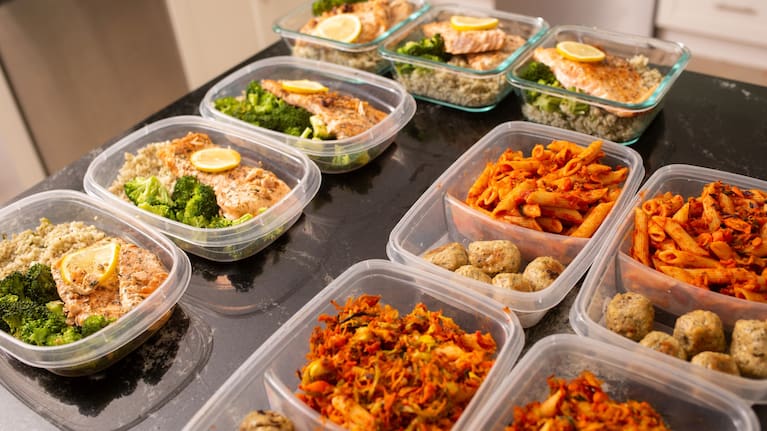Frances Cook's simple tips for cutting back on your food expenses.
Let’s be honest, most money-saving tips for food sound like they were written by someone who’s never actually followed them.
“Just meal prep for the entire week, every Sunday!” Fab, yes I’d love to spend my weekend drowning in Tupperware and existential dread.
“Grow some tomatoes, all your problems will be solved!” Sure, as long as you own your own home, and don’t have to buy any of the gardening supplies that might change the cost-benefit analysis.

Food is one of those core costs that is unavoidable, and lately that cost feels like it’s been shooting up faster than house prices.
So ok, there’s no one silver bullet that will solve the issue for everyone.
But there are different things you can try, without resorting to sad desk salads or living off instant noodles.
If even one of these works for you, it might help get that food budget back under control.
1. Stop shopping at just one supermarket
Loyalty is sweet, but not when it’s costing you money. Prices vary wildly between stores, and the cheapest place for veggies might not be the cheapest for pantry staples like flour.
Rotate between a few spots, keep a note of where things are cheapest, and stock up strategically.
Even better, try a website like Grocer.nz to help you price compare, and save yourself a little mental headspace.
2. Meal prep - with a difference
Meal prepping works for some people, but for the rest of us, planning and preparing for a week's worth of meals feels like punishment.
Instead, prep components: roast some veggies, cook a batch of rice or pasta, marinate some meat or tofu. Then mix and match throughout the week, leaving room for spontenaity.
It keeps things flexible without the stress of starting from scratch every night.
3. Actually, don’t stock up
There’s an art to bulk buying. Do it wrong, and you’ll end up throwing out half of your “bargain buys”.
Don’t bother with most fresh foods. When it comes to vege, the more frequently you can shop for small amounts, the less likely you are to end up with slimy unopened bags of rocket in your fridge.
It’s probably also not worth it if it’s something you don’t eat often. Just because they're cheap, doesn’t mean you’ll suddenly develop a taste for soaking mountains of dried chickpeas.
But if you see a good deal on a staple, or items like canned foods, get amongst.
Anything like rice, pasta, flour, and canned goods? Great. A giant 2kg bag of spinach? Probably not.
4. Make the freezer your best mate
Meat on sale? Freeze it.
Made a big batch of soup with leftovers? Freeze it.
Fresh herbs that are about to go bad? Chop them up, and freeze them in ice cube trays with a little olive oil.
Waste not, want not, etc etc.
5. Have some go-to fakeaway meals
Sometimes, you just need takeaways. Being honest about this can let you plan ahead for those tired nights, so that you have an option that scratches the same itch for a fraction of the price.
Frozen chicken nuggets and chips, curry from a jar, the best sauce and noodles combo you’ve ever tried.
It’s probably also better for you than a drive-thru burger. So win-win.
6. Have a ‘use it up’ challenge once a month
Before your next grocery shop, challenge yourself to cook at least one or two meals using only what you already have.
Most of us have forgotten tins of beans, half-bags of pasta, or veggies on their last legs hiding in the fridge.
A quick Google search for recipe ideas with what you’ve got can turn those leftovers into a full meal.
7. Don’t sleep on cheaper, ugly veges
Many stores now have a section for slightly bruised or odd-shaped fruit and veggies at a decent discount.
Even better, some companies will deliver boxes of in-season, wonky veges to your house every week.
They taste exactly the same, and frankly, by the time you’ve cooked them as part of a meal, they probably look the same too.
Get that smug glow by saving money and food waste at the same time.
8. Get creative with snacks
Packaged snacks are some of the most overpriced things in the supermarket.
Instead of buying muesli bars, make a batch of homemade oat bars. Swap out snack packs for bulk nuts, popcorn, or homemade hummus with chopped veggies.
Or honestly, go for a piece of fruit.
You’re not paying for all the marketing that goes into the wrapper, so it’s almost always a better deal.
Saving money on food isn’t about deprivation, but it may require some habit changes.
Once you’ve got them in place, you’ll barely notice the difference – except to your wallet.
Information in this column is general in nature and should not be taken as individual financial advice.





















SHARE ME